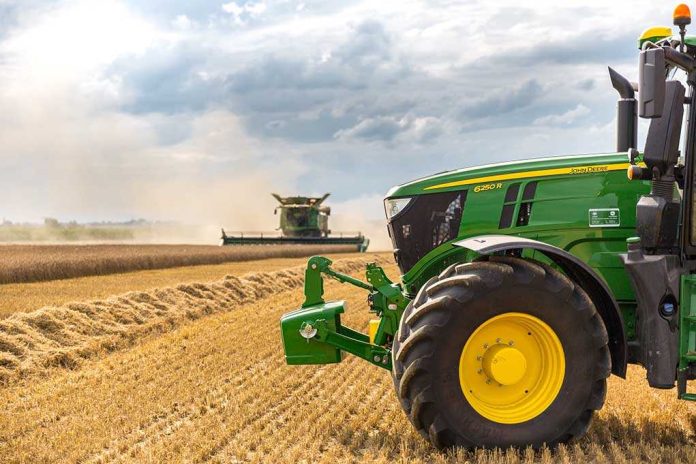
Hundreds of American manufacturing jobs are disappearing as John Deere announces major layoffs, exposing the harsh costs of economic decline and failed policies that have battered the heartland.
Story Snapshot
- John Deere confirmed layoffs of 238 workers across three Midwest plants in August 2025, with a now-removed notice hinting at nearly 1,000 more job cuts in East Moline, Illinois.
- Declining demand for farm equipment and broader industry downturns are driving the workforce reductions, while the company emphasizes a shift toward automation and digital transformation.
- Local communities and families, already strained by inflation and economic uncertainty, face increased hardship and instability from the loss of stable manufacturing jobs.
- These layoffs underscore persistent vulnerabilities in American manufacturing, raising questions about the future of U.S. industry, worker security, and small-town resilience.
Layoffs Strike Heartland Manufacturing: What Happened and Why
In August 2025, John Deere—a symbol of American manufacturing and agricultural innovation—confirmed the layoff of 238 employees at three key Midwest facilities, with a now-retracted WARN notice suggesting as many as 1,000 jobs could be lost in East Moline, Illinois. The company attributed these cuts to sharply reduced demand for agricultural equipment, a trend mirrored across the sector as farmers grapple with lower commodity prices and shrinking incomes. The layoffs come at a time when many Americans are already feeling the squeeze from persistent inflation and broader economic uncertainty.
John Deere’s decision is not unprecedented. The company, founded in 1837, has weathered multiple agricultural cycles and historically adjusted its workforce to match market realities. Yet, the timing of these cuts—alongside ongoing supply chain disruptions, rising tariff-related costs, and global economic tensions—intensifies the pain for employees and their families. Midwest towns, heavily reliant on manufacturing, will likely see direct impacts as reduced payrolls ripple through local businesses, schools, and community services.
Strategic Shifts: Automation, Digitalization, and the Erosion of Local Opportunity
Beyond immediate job losses, the layoffs reflect a deeper industry transformation. John Deere’s leadership frames these reductions as part of a long-term push toward operational efficiency, automation, and digital technology investments. While such modernization may boost corporate resilience and investor confidence, it also accelerates the erosion of traditional manufacturing roles. Workers facing job cuts may see fewer retraining opportunities and greater uncertainty, as the factory floor increasingly yields to machines and high-tech solutions. For many, this shift raises concerns about the erosion of stable, well-paying jobs that have historically supported American families and fueled small-town prosperity.
The rapid advance of automation in agriculture and related industries signals a fundamental reordering of the labor market. Experts warn that, without robust efforts to retrain and redeploy affected workers, entire communities could face long-term destabilization. Local economies, already stretched by inflation and reduced demand, may struggle to absorb displaced employees, risking increased unemployment, outmigration, and social strain.
Broader Implications: Community Hardship and the Future of American Industry
The impact of John Deere’s layoffs reaches far beyond factory gates. In the short term, families lose vital income, and local governments contend with declining tax revenues and increased demand for social services. Small businesses that depend on plant workers’ spending may be forced to cut back or close. Over the longer term, the shift toward automation and digital operations could spell further workforce reductions, especially if market conditions fail to rebound.
These developments highlight a persistent vulnerability in American manufacturing: when globalist pressures, supply disruptions, and misguided economic priorities undermine local industry, Main Street pays the price. For communities in Illinois and across the Midwest—already wary of policies that favor international interests or stifle domestic opportunity—the John Deere layoffs serve as a stark reminder that defending American jobs and values requires vigilance, sound leadership, and policies that put the heartland first.
Expert Perspectives and Outlook
Industry analysts regard John Deere’s move as an unfortunate but necessary step to stay competitive during a cyclical downturn. Investors may welcome cost controls and a focus on future technologies, but labor advocates and local officials warn of rising social and economic costs. Academic experts stress the importance of comprehensive retraining programs and robust support for displaced workers, cautioning that failing to address these needs could undermine community stability and long-term innovation. As John Deere’s restructuring unfolds, the story remains a bellwether for the challenges—and potential—facing American manufacturing in an era of rapid change.
John Deere announces hundreds of layoffs https://t.co/ab8EANY5OZ
— Tristan @triszam.bsky.social (@Triszam) August 19, 2025
While some uncertainty persists around the exact scope of job losses—particularly due to the removed WARN notice—the consensus among industry sources is clear: these layoffs are driven by market realities and a relentless shift toward automation, not merely by financial distress. For working families and conservative communities, the question now is how to restore lasting opportunity, protect American industry, and ensure that Main Street is never again left behind.
Sources:
John Deere Confirms 238 Layoffs Across 3 Plants
John Deere Releases 3rd Quarter Earnings, Mass Layoff Notice Posted in Illinois
John Deere 2025 Layoffs: Case Study in Earnings Resilience and Mid-Cap Industrial Valuations







